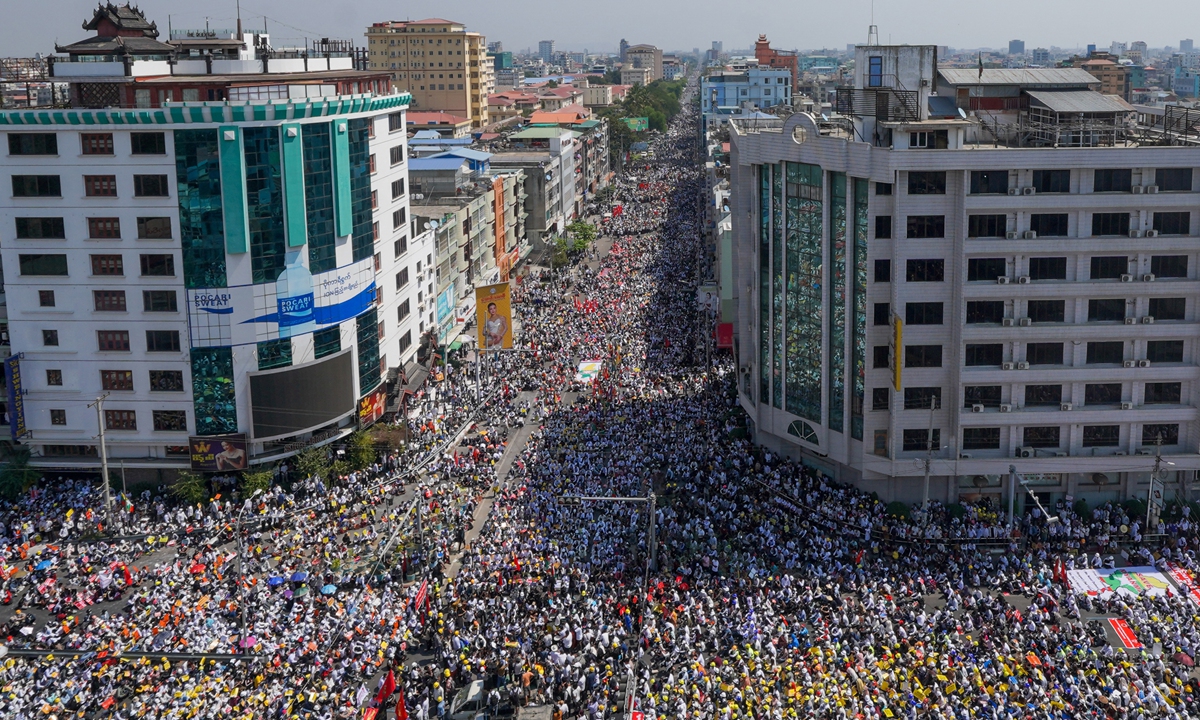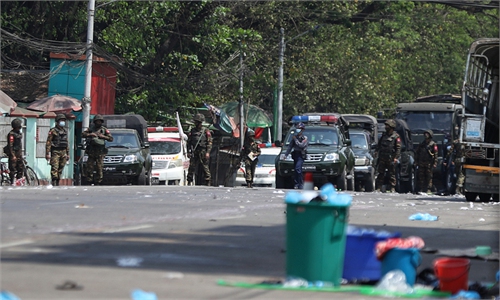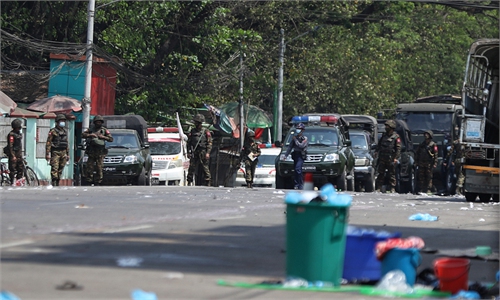West utterly manipulates Myanmar situation as a tool in anti-China campaign

Protesters take part in a demonstration against the military upheaval in Mandalay, Myanmar on Monday. Photo: AFP
Since the beginning of the political upheaval in Myanmar, Western media outlets have not stopped manipulating the situation in the country as a tool to hype their conspiracy theories about China. The smears have become even fiercer as the situation intensifies.
The West has been making use of the situation in Myanmar to attack China, mainly for the following purposes. First, from the geopolitical perspective, they are worried that their sanctions on the Myanmar military will push it toward China. So they hype that China is behind the turmoil in a bid to prevent the Myanmar military from having a favorable relationship with China as the Aung San Suu Kyi government did.
Second, they want to create antagonism between Myanmar people and China, aiming at damaging the basis of the long-term friendship between the two countries.
Third, they are exaggerating China's responsibility, attempting to force China to interfere in the Myanmar situation, so as to trap China in the spiral. In other words, the West does not care about how the situation in Myanmar will develop but rather about how much China will be troubled by it.
The West's attitude is a reflection of its hypocrisy. It upholds the banner of democracy and human rights, but turns a blind eye to how badly the Myanmar people will suffer if the situation gets even worse.
A verified Twitter account, which belongs to the "Founder and Executive Director of [London-based] Burma Human Rights Network (BHRN)," on March 12 instigated violence and attacks on Chinese factories in Myanmar. The post threatened that, "If one civilian killed one Chinese factory will become ashes."
Although some Western media outlets have reported the attacks on the Chinese factories, they were reluctant to condemn such inflammatory instigation. Instead, they linked rumors that China supports the Myanmar military with the attacks to continue deepening Myanmar people's misunderstanding of and hatred against China.
The destruction of these factories directly hurt not only the Chinese businesspeople, but also the livelihoods of local workers. This shows that the West's intention to seek geopolitical benefits by escalating the situation in Myanmar is more than apparent. The West does not care about people's fate but rather about maintaining their hegemony in the campaign against China.
They have incited antagonism, confrontation and hatred, which are not helpful to address the Myanmar situation. It will only push the situation further into turmoil. Under upheaval, it is the Myanmar people, whom the West claims it fights for, that will suffer.
Now the West has attributed the turmoil in Myanmar to China and it is misleading people to believe that China is the one backing the Myanmar military. By doing so, the West aims to demonize China and push the country to the opposite side against Myanmar people.
In addition to Western media, many Western government-backed NGOs have also added fuel to the flames.
During Myanmar's democratic transition process, these NGOs have prevailed and put their roots down in the country. They managed to promote Western-style concepts and make Western model a mainstream in Myanmar.
However, these NGOs are de facto proxies of the West. They have been engaged in spiritual colonization moves under the veneer of so-called public benefit activities concerning democracy and human rights. Their actions are deceptive, but when it comes to events involving China they stand out. For example, they have actively intervened in disputes over projects such as Myistone Dam and Letpadaung copper mine. They have actually acted as the West's long arms in Myanmar to constantly damage China-Myanmar relations.
In addition to the BHRN, which is funded by the National Endowment for Democracy, a veteran anti-China foundation financed by the US government, there are also many others spreading rumors about China in Myanmar. According to some previous Global Times investigative reports, these include the Milk Tea Alliance, a loose online coalition, the Institute for Strategy and Policy - Myanmar (ISP Myanmar), a self-proclaimed "independent, non-partisan" think tank based in Yangon, and the Justice for Myanmar.
The West is proud of Myanmar's democratic transition that is seen as a trophy for their ideology export. During that 10-year reform, traditional media has gained plenty of room in Myanmar, with the rapid development of social media. Now there are about 22 million users of social media in Myanmar, which has allowed fast spread of information, news, and also rumors in the country. Taking advantage of this, the West also uses social media as a platform to mislead Myanmar people with extreme narratives.
China is a friendly neighbor that respects the domestic affairs of Myanmar. China hopes Myanmar can prosper with people living in peace and stability. Portraying such a country as a supporter of the turbulent situation in Myanmar is completely despicable.
The article was compiled based on an interview with Xu Liping, director of the Center for Southeast Asian Studies at the Chinese Academy of Social Sciences. opinion@globaltimes.com.cn


